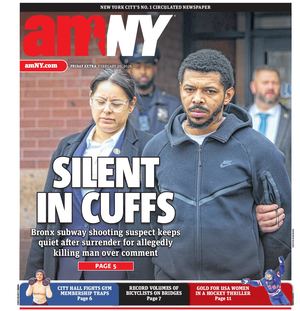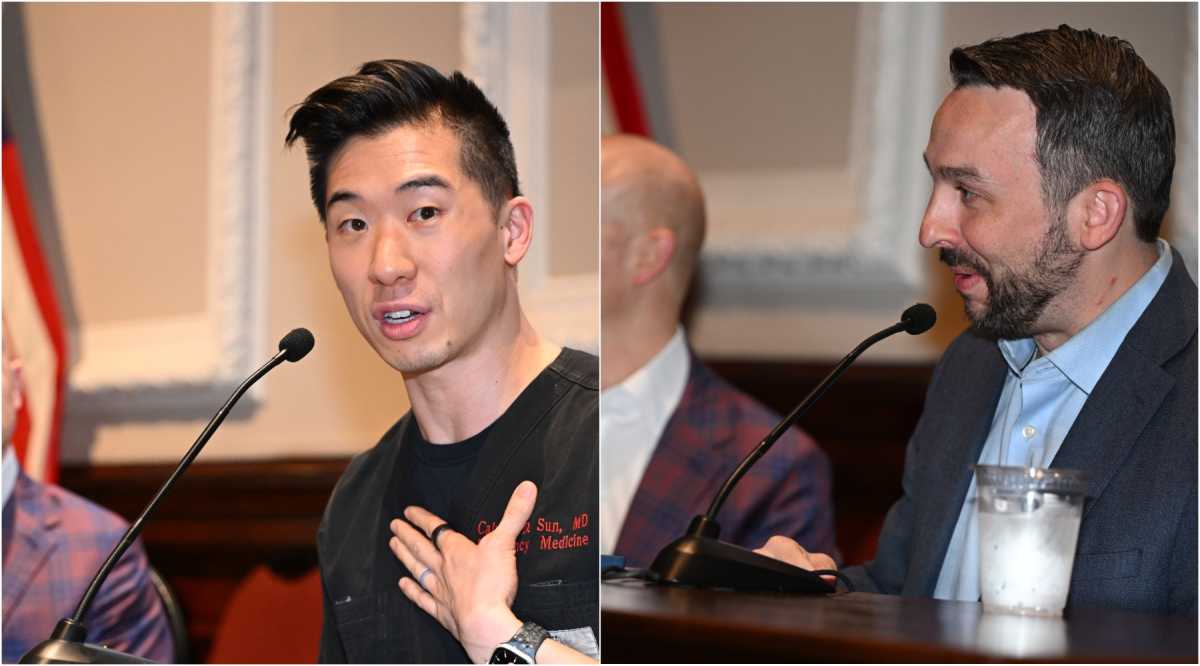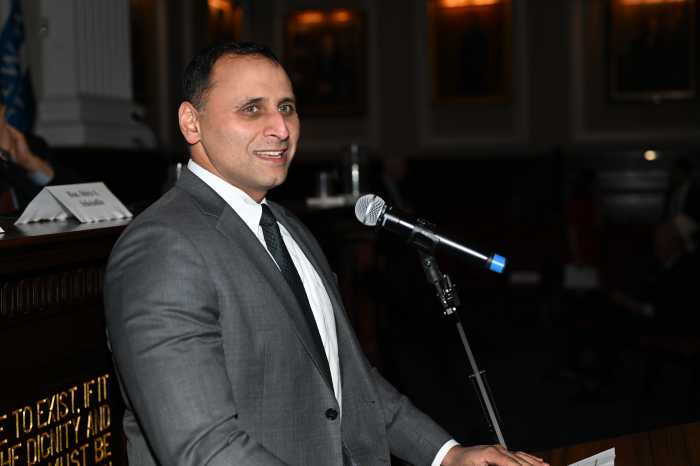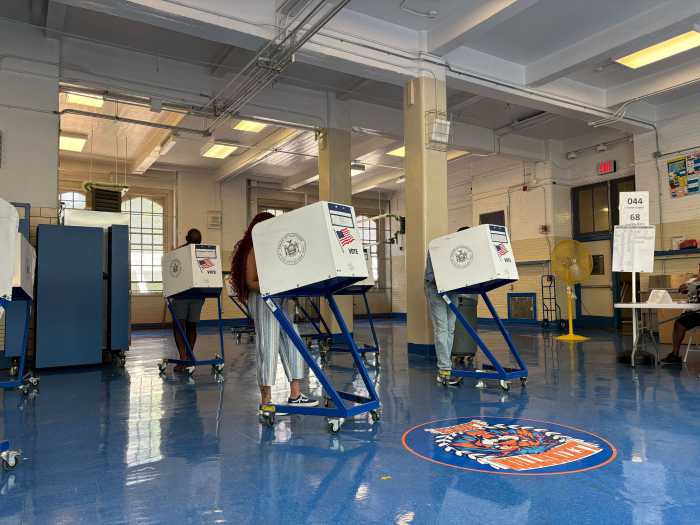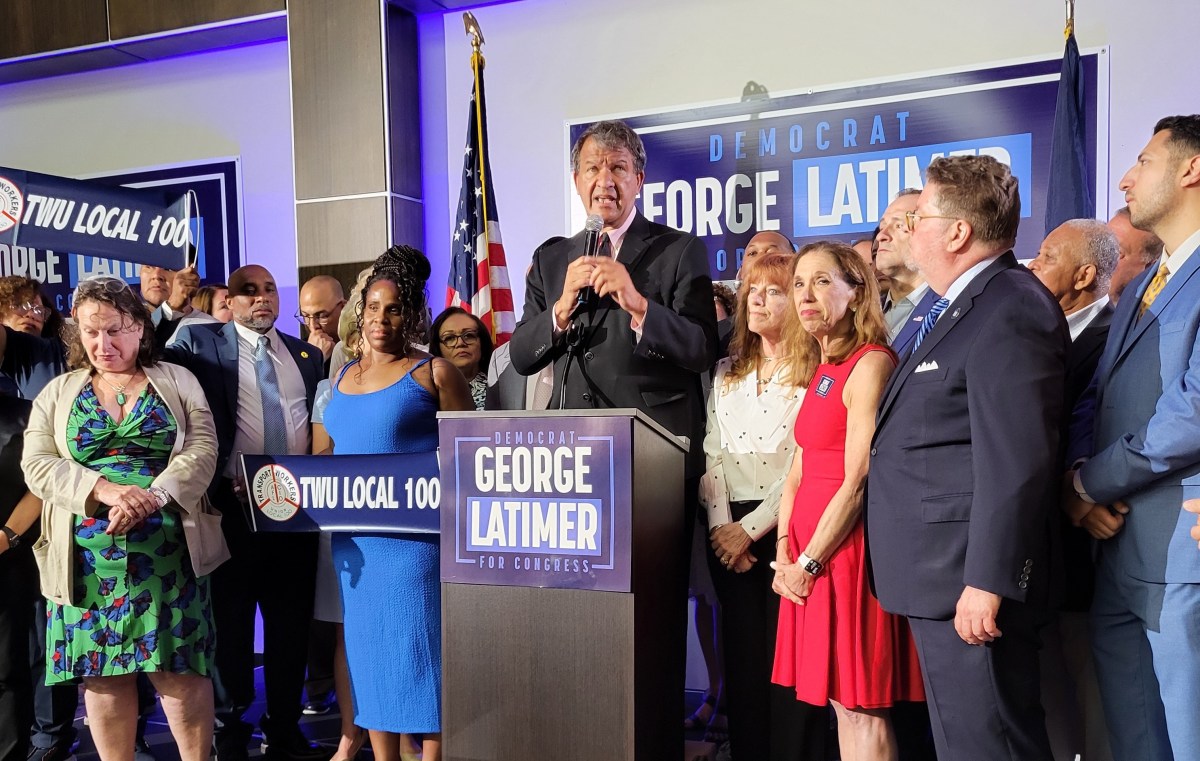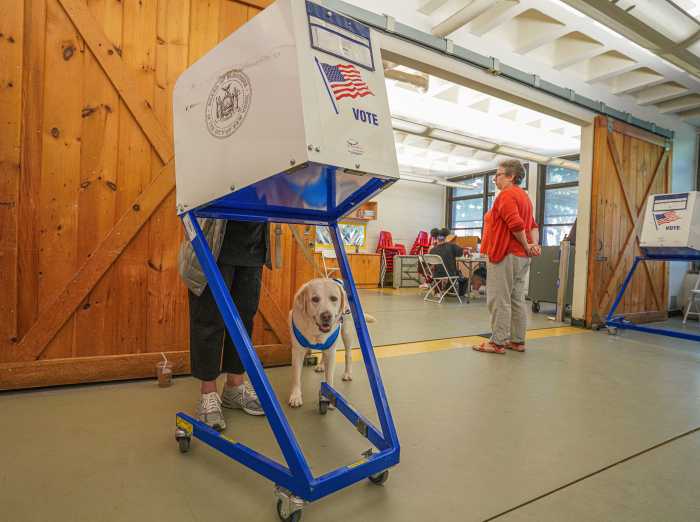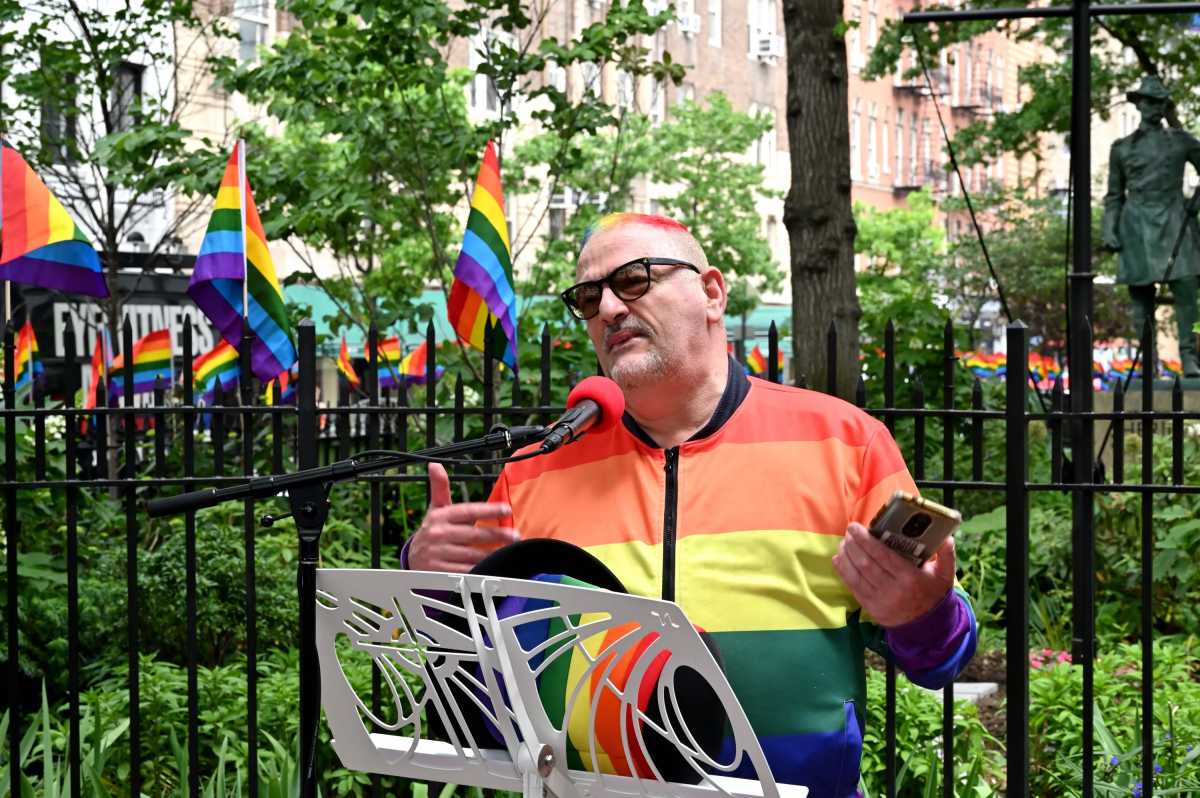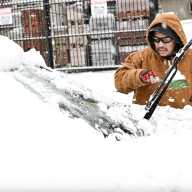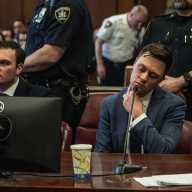Democratic candidates running for Manhattan Borough President were skeptical Wednesday night about the federal government’s plans to renovate Penn Station, stressing the need for city and state involvement in all aspects of the project to reconstruct the iconic Midtown transportation hub.
Speaking at a candidates’ forum hosted by PoliticsNY, AARP New York, and the New York City Bar Association on May 7, outgoing City Council Member Keith Powers said the matter would be a “day one action” for him if he were elected, seeing the role of Manhattan BP as vital in bringing all necessary stakeholders together.
President Trump’s Department of Transportation (USDOT) crushed the MTA’s plans for a revitalized Penn Station last month, choosing instead to take on the project itself with the federally backed Amtrak rail system. MTA CEO Janno Lieber has previously welcomed the takeover, but he expects to participate in the federal agency’s efforts to revamp the station in the future.
“It’s a really complicated equation,” said Powers. “I am not looking to co-operate with Donald Trump on really anything. I just want to be clear about that, but I am looking to cooperate with my federal counterparts and my city, state counterparts to make sure that we get a really good plan that delivers everything that we need in terms of housing, to the public realm outside of it, and to deliver a good public transportation. It is a really critical hub to our city.”
“I have scrutiny of the federal administration today to really think through complicated issues in a thoughtful way. So there’s obviously a little bit of distrust about that,” he added.
Candidate Dr. Calvin Sun, an emergency doctor, said he would need to see the USDOT’s plan before backing any changes to Penn Station.
“I fear for the standards that are not going to be met, that we transition the upkeep of a station like that to a federal government that seems to want to wage a vendetta against our city, more so depriving us of the resources and funding that we need in order to keep our city going,” said Dr Sun.
“Right now, the blustering that the Trump administration is claiming they’re doing can only be held out to snuff if they propose something that is up to code and up to par with the standards of what New Yorkers deserve in a hub like Penn Station,” Dr. Sun continued.
The third candidate running for Manhattan BP, State Sen. Brad Hoylman-Sigal, was not in attendance at the NYC Bar Association’s HQ in Midtown. The evening, moderated by Josh Schneps, CEO of Schneps Media, also featured five of the six candidates vying for Powers’ open City Council seat in District 4.
Older New Yorkers

Before the forum got underway, AARP’s New York State Office Director Beth Finkel outlined the findings of the latest AARP polling of its members, people aged 50 and older—part of the powerful voting bloc that turns out every election cycle.
In a survey of New York members, Finkel said the most pressing issue was the high cost of living, with 84% citing it as serious. Affordable housing was a major concern for 88%, while 71% want local officials to prioritize programs for aging in place.
“We have surveyed our members forever, and 80% or more always say they want to age in their own homes or in their own communities, their own neighborhoods, that they helped build up,” said Finkel. AARP’s poll also revealed that 47% believe unpaid family caregivers should be prioritized, and 25% identified ageism as a problem, particularly in the workplace.
During the forum, Powers and Dr. Sun laid out different visions for Manhattan’s older populations.
Powers emphasized the need to close loopholes in discrimination laws, including those related to age, and ensure that age is a category in all such laws. He touted his experience passing laws in the city council and his ability to work through the legislative process.
On the Department of Aging, he said he would advocate for ensuring the agency “gets its fair share of funding.”
“We can use the Borough President’s pulpit to make sure that we’re rounding up all the council members here in Manhattan to fight for and advocate for stronger budgets, to represent our aging population in New York,” he said. “Everything we do, whether it’s around housing or employment or public safety, it intersects with every single other community, age group, and population. As we tackle the hardest problems in this city, we are tackling them on behalf of everyone.”
Dr. Sun said the issue was personal to him, having cared for his grandmother and aging mother. He said the city needs to address the root causes of health issues in older adults, which he sees on a day-to-day basis, such as depression and lack of purpose, “and feeling like society has left them behind.”
He proposed creating neighborhood-based “community health hubs” to deliver preventative care directly to residents’ homes, especially seniors.
“By being more preventative and listening to your needs from the comforts of your home, we can save billions of dollars of healthcare waste and expenditures that’s been earmarked to our public health system, that then can be reinvested into programs like Haven Green or Meals on Wheels or adult community centers, so that our seniors have a place to go to be connected, to feel reinvigorated again, to feel a sense of purpose that addresses the root cause of most of their health complaints,” Dr. Sun said.
Framing his campaign as a response to systemic policy failures, Sun says he aims to “move New York from surviving to thriving,” using his experience in emergency medicine to lead in crisis prevention and recovery. To increase housing supply and lower costs, comparing it to a mass casualty situation in hospitals, he backed converting empty commercial real estate into transitional supportive housing and expediting land use decisions.
Meanwhile, Powers discussed the need for accountability in land use deals and the importance of ensuring that community agreements are met. He advocated for giving the borough president’s office greater power in initiating land use applications — a process currently dominated by private developers and City Hall — and pointed to community-led housing studies as models for a proactive approach.
He said the example of the successful housing deal in Waterside Plaza, where rents were frozen and housing units were locked in for long-term affordability, should be replicated across the city.
On transit, he supported congestion pricing, noting residents should have had more input, calling for more enforcement to combat fare evasion. “We need to get back to basics and enforce the law,” he said. “When you swipe your MetroCard and the person behind you doesn’t, it feels unfair.”
Dr Sun said he supports the concept of dynamic congestion pricing, which is “based on real-time traffic data, just like surge pricing, so drivers have a window to change their driving habits to avoid congestion pricing entirely.”
“But if it goes above a certain trip wire within that window, then people have to pay congestion pricing while also making sure that our lower-income New Yorkers are exempt from congestion pricing altogether,” he said, adding that the public bus map needs to be re-developed to make it more engageable so New Yorkers are incentivized as well as pedestrianizing more areas of Manhattan.
On fare evasion, Sun stated: “We need consequences, but not violence. I want to create buy-in by improving the quality and accessibility of our subways — so people see the value of their investment.”
The race for District 4
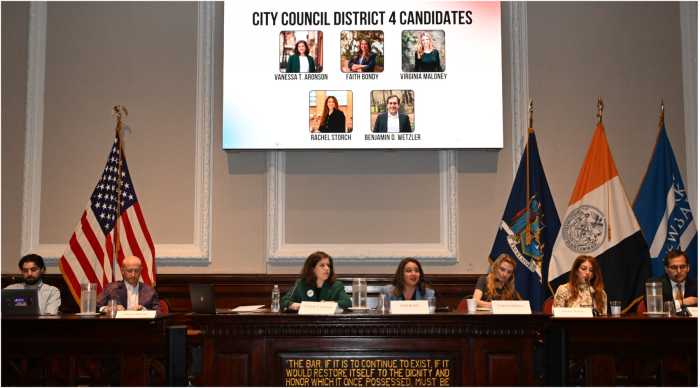
The second portion of the evening saw five of the six candidates running to succeed Council Member Keith Powers in Manhattan’s District 4 make their pitches to voters, laying out their visions for how to tackle the city’s housing affordability crisis, public safety concerns, and aging infrastructure – largely in agreement.
Virginia Maloney, Meta product manager and daughter of former U.S. Rep. Carolyn Maloney, said the city’s affordability crisis is driving working- and middle-class residents out. “We need to keep people in their homes,” she said, calling for expanded tenant protections and converting underused Midtown office space into residential units.
“City of Yes is a start, but we need to be doing a lot more,” said Maloney. “Housing alone is not enough. We need accessible housing that allows seniors to age in place, have all the right tools, and invest in naturally occurring retirement communities that we have an abundance of here in New York.”
Rachel Storch, a former Missouri state representative, cited her 25 years in public service and decried what she called a “decline in quality of life” driven by mental illness, crime, and housing instability.
“The only way to tackle the housing crisis is to build more affordable housing. Vacancy rates cover around one and a half percent. We need more supply, and we need to ensure that any housing includes affordable units, not just for singles, but two and three-unit homes for families,” she said. “We’ve got to protect rent stabilization and protect against predatory landlords.”
Vanessa Aronson, a former public school teacher and Lexington Democratic Club president, described housing affordability as her top priority. “We’re losing affordable housing at an alarming rate,” she said, urging enforcement of existing housing mandates to ensure “affordable units that are promised by developers are actually followed through.”
Faith Bondy, a longtime PTA leader and attorney, stressed the need to incentivize developers to build affordable housing, while emphasizing the need to expand wraparound services for seniors and making the information more readily available to them because “so many New Yorkers are eligible don’t know they’re eligible, and don’t take advantages of programs that will freeze their rents, give them tax abatement, and therefore make their lives more affordable.”
On the issue of the mental health and homelessness crisis, Benjamin Wetzler, a state housing policy staffer, said it was important to distinguish between the New Yorkers who are “living the worst possible manifestation of the broader housing affordability crisis.” And that any measures taken by policymakers to reduce the cost of living will reduce the homelessness crisis in the city for a lot of people. For those who intersect between homelessness and mental health/drug issues, he said the city is “not doing a good job of connecting people with the appropriate kind of service,” calling for more investment in” permanent, supportive setting that really fits their needs.”
Legislative priorities
Candidates were asked what their first legislative priorities would be should they be elected.
Public safety is Storch’s top concern. She says she would advocate for a greater investment in the NYPD to ensure the hiring of at least 5,000 officers, and push for legislation to have e-bikes licensed at the point of sale.
“The force is really depleted right now,” she said. “We need to make sure we have enough detectives in place, and we are recruiting and training the detectives. We need to make sure we have enough school safety officers who are all aware of increased violence in schools, and the number of school safety officers has been cut by almost 50%.
Wetlzer pointed to the recent legislative package to regulate the city’s scourge of scaffolding, which he says did not go far enough by allowing technological inspections of structures and buildings.
“Allowing safety inspections of buildings to be done using technology that will no longer require anyone to actually go up there and do it, you could use a camera or use a drone, that’s a very basic quality of life thing that would have enormous impact on our neighborhood and on our city that would essentially result in no loss to anyone in the neighborhood except the company’s who put up these structures,” he said. “And I would want to do that on day one.”
Raising concerns about the city’s challenges in the face of federal cuts, Aronson called for a bold legislative approach that would mirror a bill currently being considered at the state level. She said she would back a bill allowing New York to redirect federal tax withholdings to local services if national funding is cut.
“I think that that’s one way that we can fight back against what we know is happening to our city services,” she said. Already, there are cuts in things like Meals on Wheels, services for seniors, in public education. We know it’s coming.”
Bondy said she is not generally a proponent of “just having to enact more legislation, just to have legislation,” but she would back bills already at the council level, like banning e-bikes in public parks and requiring their registration and insurance, as well as bringing back the mask ban.
“Generally, our biggest impact is really through funding, and so, I would make sure that every student has a high-quality school close to home, that our seniors have the services they require, and that our police forces have the resources they need to keep us safe on a daily basis,” said Bondy.
Maloney said the laws are in place, and “that means supporting our police force.” She also backed a vacancy tax to tackle the number of empty storefronts, which “contribute to this feeling of a lack of safety here in our city.”
“Something we could do is a more modern city council,” she said. “The City Council has a $110 billion budget that we oversee, and it’s not managed as effectively as it could be right now. A simple example is investing $100 million in the MyCity portal. I have a background in tech, and would apply that with a day one goal of making all of our websites accessible.”
